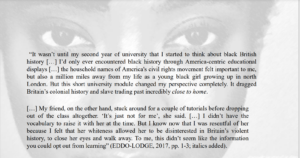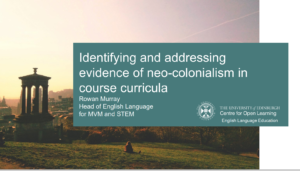‘Gone too far’: lived realities, ethical relations and confrontations in the neo-liberal university
Presenter: Nini Fang, Anne Pirrie
Session Description
This presentation stems from its collaborators’ commitment to promote relational ethics in a sector that has been increasingly colonised by new managerialism and the associated mechanisms of performance management, surveillance and exclusion.
We take off with a story of Nini, a WoC lecturer, navigating with an ethical compass in developing an anti-racist curriculum against the backdrop of the oppressive climate of contemporary higher education. Her account of the turn of events that occurs when she goes on teaching the sessions will see her confronted by the hauntings of historical, intersectional and institutional violence. Whilst relational ethics may only emerge when we come close to the horror in the Other and move our concerns beyond the self, her daring to ‘go there’, the colonial violence and exploitation of the Other, is fated to be a doomed venture of ‘going too far’ by the god of student satisfaction.
Dangling on the thin line between truth and dare becomes for Anne and Nini a perpetual grappling with the virtue of endurance – ‘How do we stay still for long enough to allow something to happen?’ Their account is visceral rather than abstract, rooted in lived experience and critical reflection. They espouse a variant of practical aesthetics that involves thinking with rather than thinking about. They invite compassionate witnessing as well as collective rumination on how we may support each other in what can be highly distressing ventures.
“It’s 10 am on a late-autumn day. Nini turns on the light in a gloomy classroom in a university somewhere in the middle of England. Students from ethnic minorities are sitting on one side of the room, and the white students are sitting on the other…”
Identifying and addressing evidence of neo-colonialism in course curricula
Presenter: Rowan Murray
Session Description
Critical evaluation of course materials is an essential step in decolonising university curricula. This paper focusses on decolonisation of curricula and reports findings from the document analysis of an English for Academic Purposes (EAP) course designed for international students entering postgraduate study across the University and delivered by the Centre for Open Learning. While the findings are situated within a specific EAP course, this document analysis process can be easily transferred to other courses and disciplines across the University.
The power universities hold over knowledge production and reproduction is enacted through decisions surrounding what to include and disregard in curricula (Gebrial, 2018). This can lead to curricula that does not represent the epistemology and worldviews of indigenous or minority groups (Cupples, 2019; Kuokkanen, 2007). As a result, Western universities have been accused of promoting a hidden curriculum whereby the norms, cultural values and views of social order are embedded within course content (Brown, 2009).
In this paper, I outline the EAP course under review and present the guiding questions that formed the basis of the document analysis. Findings focus on the themes of Eurocentrism, evidence of a hidden curriculum, and EAP’s deference to discipline norms and values that creates a barrier for decolonising EAP. I finish with an overview of steps we have taken to mitigate neo-colonialism identified within the curricula.
References
Brown, G. (2009). The ontological turn in education. Journal of Critical Realism, 8 (1), 5–34.
Cupples, J. (2019). Introduction: Coloniality resurgent, coloniality interrupted. In J. Cupples, & R. Grosfoguel (Eds.), Unsettling Eurocentrism in the westernized university (pp. 1-22). Routledge.
Gebrial, D. (2018). Rhodes must fall: Oxford and movements for change. In G. K. Bhambra, D. Gebrial, & K. Nişancioğlu (Eds.), Decolonising the university (pp. 19-36). Pluto Press.
Kuokkanen, R. (2007). Reshaping the university: Responsibility, indigenous epistemes and the logic of the gift. UBC Press.


